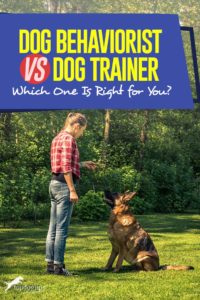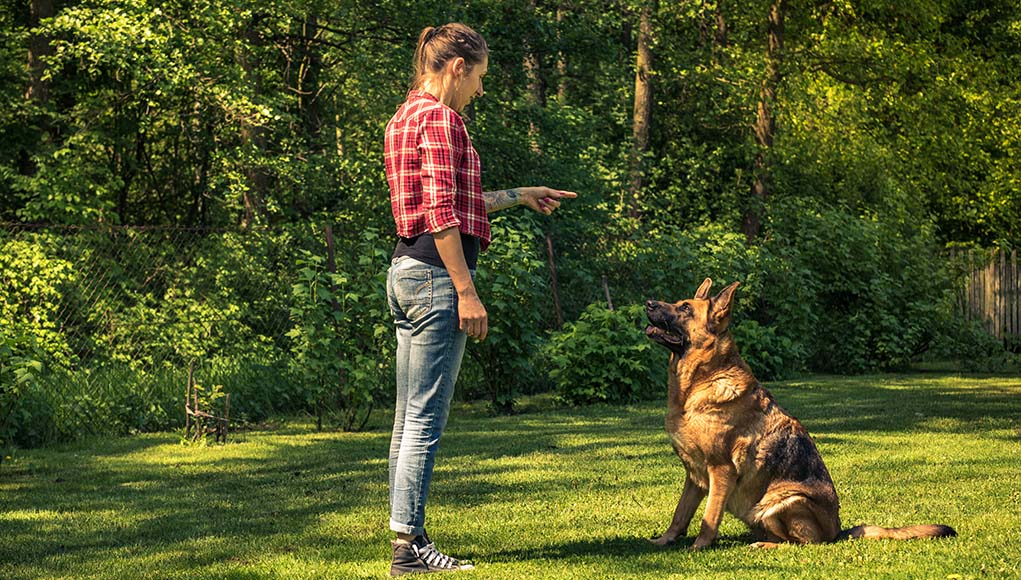Attempting to care for a difficult dog can be tiring but there are various options available for pet owners. There is a choice to try further training at home yourself, have them train with a dog trainer, or attempt the use of a dog behaviorist (or animal behaviorist). The decision is up to the owner but should be determined based upon the needs of the dog. Not all dogs require a trainer but may need time with a behaviorist instead, while the opposite can also be true.
What Is a Dog Trainer?
A dog trainer is someone who works with dog owners to train their dogs. The trainer will work with not only the canine but the owner as well in developing skills to teach the dog to respond to commands or perform specific actions that may not necessarily be natural to the dog, such as rolling over or fetching.
The training focuses mainly on the teaching of dog training to the owner. They provide basic obedience training or training for specialized activities if, for example, the dog were a show dog. They may also work individually with a dog that is having specific training problems, such as aggression, fear, separation anxiety, urinary issues, hyperactivity, excessive barking, biting, destructive behaviors, and insecurity.
Dog trainers work by using a variety of training methods that are established in dog training. They focus on using a variety of techniques, such as the Koehler method, clicker training, dominance-based training, negative-reinforcement, and relationship-based training. The determination of the type of training is based upon the breed and personality of the dog. The dog's attributes and the accuracy of the timing of reinforcement and consistent communication determine the success of the training process.
What Is a Dog Behaviorist?
A dog behaviorist, typically, is a trained individual that specializes in dealing with problem behavior or habits of the animal. They deal mainly with working with owners to manage, modify, and prevent problematic behaviors that may be occurring in their pets. Dog behaviorists study why dogs react the way they do and why they act the way they do, and are more closer to what a psychologist is to humans.
Behaviorists often have supervised hands-on experience with dogs and research focused on them. A canine behaviorist concentrates not only on finding a solution for the problem, but also finding an underlying cause if one is suspected. When a dog suddenly develops a habit that was previously nonexistent, there may be a medical cause behind it.
Approaching a dog behaviorist is not only necessary when finding treatment for a dog's behavioral issues, but they can also be consulted before adopting a dog. They will be able to educate potential owners about the different breeds and what to expect from them. It can be pertaining to common training issues to inherent personalities like if they are going to be high-energy or low-energy, the type of environment that the dog prefers, and what to expect when they get older.
ALSO READ: Canine Good Citizen Certification – Everything You Need to Know
Certifications and Licensing
At the time of this writing, there is no designated licensing/certification organizations or agencies that licenses and certifies all trainers and behaviorists in the U.S. When someone identifies themselves as a “dog trainer” or “dog behaviorist,” they do not necessarily have any previous qualifications. In the animal field, currently it's primarily the veterinary medical degree that can be mentioned (DVM, VMD). If these are not mentioned, there is no guarantee of any advanced skill or level of education other than resume.
Dog Trainer Organizations
A dog trainer’s title means very little as pretty much anybody can call themselves a dog trainer, and it'll be their previous experience and recommendations that'll back up their qualifications. But overall, there are no requirements created by any official and required governing institutions for dog trainers (such as there may be for veterinarians), though some can carry some weight.
The top two organizations that provide certification in the United States are:
- Certification Council for Professional Dog Trainers, CCPDT is a non-profit organization that attempts to maintain humane standards for animal training and professionals.
- Certified Professional Dog Trainer, KA. Requires 300 hours of training experience and pass a psychometrically sound exam.
- Certified Behavior Canine Consultants, are those that have at least 500 hours of work with canine behavior cases and must also pass the exam.
- Karen Pryor Academy is a professional educational academy for animal training that uses force-free methods and use operant conditioning to modify behavior. Graduates are required to complete a five-month educational program that uses online, didactic, and hands-on instruction to teach their students.
Behaviorist Organizations
The situation is similar to dog trainers here, and there are no “required” certifications. However, there are a few professional animal behavior organizations that grant certifications to qualified individuals that can demonstrate expanded knowledge of animal behavior, which a dog trainer may or may not pay attention two.
The two top organizations that provide such certifications in the United States are:
- The Animal Behavior Society, ABS offers two types of certification.
- Associate Applied Animal Behaviorist, AABs. Those who have earned a research-based Master’s degree from an accredited college. They must have two years of professional experience, evidence of supervised hands-on experience, and professional letters of recommendation.
- Certified Applied Animal Behaviorists, CAAB. Those who have earned a research-based Ph.D. from an accredited college. They must have five years of experience, provide recommendations, a thorough knowledge of literature, original research, and evidence of working with the species.
- International Association of Behavior Consultants, IAABC is an organization created to support the practice of companion behavior consulting. Those who have accreditation through them are required to provide references, two case studies, 300 hours of consulting, and 150 hours of course work. Higher tier members require references, three case studies, three years and 1,000 hours of consulting, and 400 hours of course work.
Which One Is Best For Me?
There's a number of areas where these two professions aren't very far apart. Some dog trainers and animal behaviorists cross paths in their methods. They may sometimes use similar methods to work with the dog to move past a problem or behavioral issue.
 A dog trainer is best for when the dog is needed to perform a specific task or action, or when a dog needs to be taught not to do a particular action (housebreaking, for example). Dog trainers will work with deep behavioral problems too, but will usually know their limits and will then refer the owner to a behaviorist for very stubborn animals, as there may be a deeper issue than training alone can solve.
A dog trainer is best for when the dog is needed to perform a specific task or action, or when a dog needs to be taught not to do a particular action (housebreaking, for example). Dog trainers will work with deep behavioral problems too, but will usually know their limits and will then refer the owner to a behaviorist for very stubborn animals, as there may be a deeper issue than training alone can solve.
A dog behaviorist is best for when the dog’s problematic behavior needs to be modified and recognizing when the dog’s behavior is abnormal, or when regular dog training techniques aren't working. They will be able to teach the owner how to understand the issue beneath the behavioral problem when present. A behaviorist will not only work to discover the issue within the dog but will also counsel the owner about the best way to interact with their dog.
READ NEXT: Most Effective Dog Training Methods According to Science














